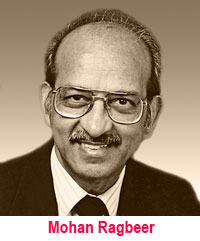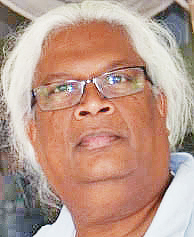Opinions
Imran Khan stumped for a duck

Hong Kong and Kashmir continue to threaten orderly government, having already caused much distress. The crisis escalates in HK; you can imagine the frustration in the faces of protesters, now hidden behind army-type gas masks; yet, their voices betray their anger. They attacked a pro-China male like hungry wolves seeing a lamb, and almost tore him apart. The administration, backed by China, is unlikely to yield, as the HK economy trembles.
The situation in Kashmir is less tense, by all non-Pakistani accounts; nearly all Muslim organisations in India have
The situation in Kashmir is less tense, by all non-Pakistani accounts; nearly all Muslim organisations in India have
endorsed the re-unification of Kashmir with India, some even calling for the recapture of northern Kashmir. This is a change from six years ago, when Tarek Fatah, Pakistan-born Canadian Muslim writer and liberal activist, observed: “Today’s militant Islamic youth of Kashmir carry placards of Bin Laden in anti-India rallies and hoist Taliban flags, while their Shia Muslim rivals are inspired by Khomeini and Hezbollah. A senior Kashmiri Muslim police officer confided, ‘Over 50% of Kashmiris between the ages of 15 and 30 are hard-core pan-Islamists, not Kashmiri nationalists.’” The Islamic insurgency in Kashmir Valley, begun in 1987 purging Hindus and Sikhs, eventually expelling 400,000 to 700,000 Hindus, leaving about 2500 by 2016, just like the violent ejection of Indians from Wismar in 1964, eliminating nearly all of the 3000 Indians in that small Guyanese town. Few of these inhuman incidents have made the vocal and anti-Hindu Western media, or elicited any pity in official Pakistan, which whines locally and internationally about current Indian retaliation; this has come 71 years too late, Nehru’s major blunder, as Ajit Doval, India’s NSA chief, agreed in his Vallabhbhai Patel Memorial speech last year.
Pakistan has spared no pains to condemn Indian police actions against miscreant Muslims, excusing wrong-doers as justice-seekers, ignoring the Pakistan-fed terrorist organisations, which have neither moral nor legal position in Kashmir, but foment and aggravate divisions to split the population between Islam and others, the latter generally preferring not to flaunt their religions.
Remember Kashmiris were Hindus and Buddhists, until forced to convert by Muslim rulers in the last millennium; they maintained peace with others, until the advent of Pakistan and the importance to that dictatorship of fabricating, and scheming to maintain a conflict status with India, however illegal it was, to justify its excessive armaments. As one writer said, “The recent history of Kashmir, is nothing but an amalgamation of successive socio-political deceptions, distortions, and blunders.”
The recent UN General Assembly meeting provided Pakistan’s PM Imran Khan an opportunity to match President Trump’s penchant for lying. Discarding the facts of history – extremist predecessors, forced Islamisation 1987-2004, disappearance of Hindu and Sikh minorities, the destruction of Temples throughout Pakistan, the ISI hegemony, Musharraf, sheltering Bin Laden, supporting the mujahideen and Hezbollah, allowing their infiltration of J&K etc. – he proposed new theories for the unrest in Kashmir, condemned Indian politics and politicians, and proposed Pakistan as a seeker of human rights; surely a joke, as Tarek Fatah told an NDTV (India) interviewer, “Pakistan is a terrorist state”; it intruded in Kashmir and Balochistan, breaking an agreement with the latter, a country rich in natural resources: oil, gas, copper and gold, but the poorest province in Pakistan with most of its people living in deplorable housing, with no access to electricity or clean drinking water. The Baloch legislature declined accession to Pakistan in 1947, which, under Jinnah, reacted between March 27 and April 1, 1948, by occupying the Baloch coast, forcing its accession to Pakistan.
Imran Khan’s UN diatribe probably aimed to deflect attention from Pakistan’s economic failure and bankruptcy, by threatening dire consequences, arguing that the UN had given Kashmir the right to self-determination! Therefore it must act against India, or face an inevitable conflict between two nuclear-armed nations, where no one can predict the results! Nuclear war will affect combatants and those outside the region.
Earlier, Pakistan was denied discussion of Kashmir at a UNHCR conference in Asia, which accepted the Indian delegates’ argument that the issue was an internal Indian one.
The UN India delegate called Pakistan the “global epicentre of terrorism”, accusing Khan of empty talk of peace, like previous promises made to the world to curb terrorist groups, and suggesting that, for peace, “renunciation of lies and threats, and self-restraint might be a good place to start”!
So Khan was being booed against the backdrop of Howdy Modi, a love-in between Modi and Trump, and later Modi’s meeting with CARICOM heads, providing them a $14M grant.
Pakistan has spared no pains to condemn Indian police actions against miscreant Muslims, excusing wrong-doers as justice-seekers, ignoring the Pakistan-fed terrorist organisations, which have neither moral nor legal position in Kashmir, but foment and aggravate divisions to split the population between Islam and others, the latter generally preferring not to flaunt their religions.
Remember Kashmiris were Hindus and Buddhists, until forced to convert by Muslim rulers in the last millennium; they maintained peace with others, until the advent of Pakistan and the importance to that dictatorship of fabricating, and scheming to maintain a conflict status with India, however illegal it was, to justify its excessive armaments. As one writer said, “The recent history of Kashmir, is nothing but an amalgamation of successive socio-political deceptions, distortions, and blunders.”
The recent UN General Assembly meeting provided Pakistan’s PM Imran Khan an opportunity to match President Trump’s penchant for lying. Discarding the facts of history – extremist predecessors, forced Islamisation 1987-2004, disappearance of Hindu and Sikh minorities, the destruction of Temples throughout Pakistan, the ISI hegemony, Musharraf, sheltering Bin Laden, supporting the mujahideen and Hezbollah, allowing their infiltration of J&K etc. – he proposed new theories for the unrest in Kashmir, condemned Indian politics and politicians, and proposed Pakistan as a seeker of human rights; surely a joke, as Tarek Fatah told an NDTV (India) interviewer, “Pakistan is a terrorist state”; it intruded in Kashmir and Balochistan, breaking an agreement with the latter, a country rich in natural resources: oil, gas, copper and gold, but the poorest province in Pakistan with most of its people living in deplorable housing, with no access to electricity or clean drinking water. The Baloch legislature declined accession to Pakistan in 1947, which, under Jinnah, reacted between March 27 and April 1, 1948, by occupying the Baloch coast, forcing its accession to Pakistan.
Imran Khan’s UN diatribe probably aimed to deflect attention from Pakistan’s economic failure and bankruptcy, by threatening dire consequences, arguing that the UN had given Kashmir the right to self-determination! Therefore it must act against India, or face an inevitable conflict between two nuclear-armed nations, where no one can predict the results! Nuclear war will affect combatants and those outside the region.
Earlier, Pakistan was denied discussion of Kashmir at a UNHCR conference in Asia, which accepted the Indian delegates’ argument that the issue was an internal Indian one.
The UN India delegate called Pakistan the “global epicentre of terrorism”, accusing Khan of empty talk of peace, like previous promises made to the world to curb terrorist groups, and suggesting that, for peace, “renunciation of lies and threats, and self-restraint might be a good place to start”!
So Khan was being booed against the backdrop of Howdy Modi, a love-in between Modi and Trump, and later Modi’s meeting with CARICOM heads, providing them a $14M grant.
Avocadoes the flavour,
texture of butter
 Romeo Kaseram
Romeo Kaseram
For me to revisit my ongoing discourse about avocadoes means I am beginning to understand why this fruit is so coveted back home.
Growing up in the homeland, it was a gold mine to own an avocado tree producing fruits close to the flavour and quality of real butter. It was like having gold in the bank, and more; it was to also have a belly-laugh on the way to the vault.
I will tell you what I mean when I say, “The flavour and quality of real butter”. In my boyhood days, real butter was expensive and difficult to acquire. We made do with a runny concoction, always warm, and so highly salted the grains
could be counted with the naked eye. Sometimes it was red, but mostly a deep, rich yellow, perhaps with food colouring. It was bought by the ounce at the larger shops when I was growing up back home, and at tiny “parlours”, those mom-and-pop corner stores that sprang up underneath houses like mushrooms after extended rainfall. I recall this “salted butter” came from New Zealand, which was written large on its large, golden tins, the lifted, circular top jagged from the shopkeeper sawing it open using a household can-opener.
This “butter” did not last long in households, quickly going rancid in the tropical heat, so it was purchased on a need-to-use basis. I always found the times tiresome when it was needed for cooking, since those were the days when I was mostly occupied with small but eventful moments in my young life, such as contentedly spinning a homemade top.
The longer minutes in these passing boyhood hours were spent tightly winding the string around the top. The string was the coveted marling, bought at great cost per foot from our friendly-neighbourhood but unscrupulous shopkeeper, who would pinch an inch or two off the length of twine if one was inattentive. Then came the toss, and the happy whirring of the top as it landed right.
The call for “butter” would come in the middle of my best efforts, when finally I had hit the sweet spot, and toss after toss would see the fruit of my efforts with the top landing noiselessly on its nail-point, as if it was an alien spacecraft stealthily come down to earth. The top would spin with so much grace and balance it seemed to be frozen and motionless.
Gazing into this moment of ambivalence, when the top was spinning so efficiently it appeared to be fixed in place, miraculously balanced on its one-tooth nail, gave as much joy as it was a wonder to behold. It was art turned into a paradox, where motion was at a standstill, fulfilling as it was uplifting.
The hum of the whirring top would then be punctuated with a piercing, parental imperative, either my mother’s shrill, no-nonsense voice, or my grandmother’s loving call to action. I was wanted to run off on a “message”, which then in our language meant a disruptive chore.
It was a frustrating intrusion, worthy of a pout, impetuous stamping of shoeless feet, and a whining complaint, which roughly translated meant, “Young people nowadays are not being left alone to fully enjoy their childhood days.” It was threat or treat, the former grievous bodily harm from my mother, the latter from my grandmother – buying myself a “sweetie” with the leftover change to assuage my leveraged impetuosity.
This time the matriarchal imperative was, “Take this money and hold it tight in your sweaty hand. Run fast down the road to Pooran shop. Buy three ounces of salt butter and bring it back quick haste before the hot sun melts it. And make sure you keep your eye on the scale. You know how the shopkeeper is unscrupulous. Don’t get robbed! The scale must balance when the needle reach the number three!”
A final spin of the top was always squeezed in before I sullenly left on the “message”. It was difficult winding the marling onto the top, then tossing it with one hand disabled with a death grip clutch on the coins.
That my world had now tilted was evident in that final toss – the top landed unsteady, off-centre, dodging and erratic, leaning on its side as drunk as my next-door neighbour stumbling home on fortnight Friday night, after the shopkeeper had robbed him of his bi-weekly wages.
Now there were those living among us who had traveled to the distant capital city. They returned with incredible tales of eating in restaurants overlooking an unending, quiescent sea, and being served real butter that was solid, unsalted, and not putrid. Remarkably, the bread had to be warmed so the butter melted. These fortunate travelers said the closest taste and texture to this real butter were from the avocadoes ripening on the tree in my grandmother’s backyard.
“Better than butter!” My grandmother smacked her lips when visitors to her market stall tentatively picked up our avocadoes. As large as cannonballs, each avocado was sold by the ounce, Ma’s scale always weighing true, the money honest, and coveted as gold.
This “butter” did not last long in households, quickly going rancid in the tropical heat, so it was purchased on a need-to-use basis. I always found the times tiresome when it was needed for cooking, since those were the days when I was mostly occupied with small but eventful moments in my young life, such as contentedly spinning a homemade top.
The longer minutes in these passing boyhood hours were spent tightly winding the string around the top. The string was the coveted marling, bought at great cost per foot from our friendly-neighbourhood but unscrupulous shopkeeper, who would pinch an inch or two off the length of twine if one was inattentive. Then came the toss, and the happy whirring of the top as it landed right.
The call for “butter” would come in the middle of my best efforts, when finally I had hit the sweet spot, and toss after toss would see the fruit of my efforts with the top landing noiselessly on its nail-point, as if it was an alien spacecraft stealthily come down to earth. The top would spin with so much grace and balance it seemed to be frozen and motionless.
Gazing into this moment of ambivalence, when the top was spinning so efficiently it appeared to be fixed in place, miraculously balanced on its one-tooth nail, gave as much joy as it was a wonder to behold. It was art turned into a paradox, where motion was at a standstill, fulfilling as it was uplifting.
The hum of the whirring top would then be punctuated with a piercing, parental imperative, either my mother’s shrill, no-nonsense voice, or my grandmother’s loving call to action. I was wanted to run off on a “message”, which then in our language meant a disruptive chore.
It was a frustrating intrusion, worthy of a pout, impetuous stamping of shoeless feet, and a whining complaint, which roughly translated meant, “Young people nowadays are not being left alone to fully enjoy their childhood days.” It was threat or treat, the former grievous bodily harm from my mother, the latter from my grandmother – buying myself a “sweetie” with the leftover change to assuage my leveraged impetuosity.
This time the matriarchal imperative was, “Take this money and hold it tight in your sweaty hand. Run fast down the road to Pooran shop. Buy three ounces of salt butter and bring it back quick haste before the hot sun melts it. And make sure you keep your eye on the scale. You know how the shopkeeper is unscrupulous. Don’t get robbed! The scale must balance when the needle reach the number three!”
A final spin of the top was always squeezed in before I sullenly left on the “message”. It was difficult winding the marling onto the top, then tossing it with one hand disabled with a death grip clutch on the coins.
That my world had now tilted was evident in that final toss – the top landed unsteady, off-centre, dodging and erratic, leaning on its side as drunk as my next-door neighbour stumbling home on fortnight Friday night, after the shopkeeper had robbed him of his bi-weekly wages.
Now there were those living among us who had traveled to the distant capital city. They returned with incredible tales of eating in restaurants overlooking an unending, quiescent sea, and being served real butter that was solid, unsalted, and not putrid. Remarkably, the bread had to be warmed so the butter melted. These fortunate travelers said the closest taste and texture to this real butter were from the avocadoes ripening on the tree in my grandmother’s backyard.
“Better than butter!” My grandmother smacked her lips when visitors to her market stall tentatively picked up our avocadoes. As large as cannonballs, each avocado was sold by the ounce, Ma’s scale always weighing true, the money honest, and coveted as gold.
